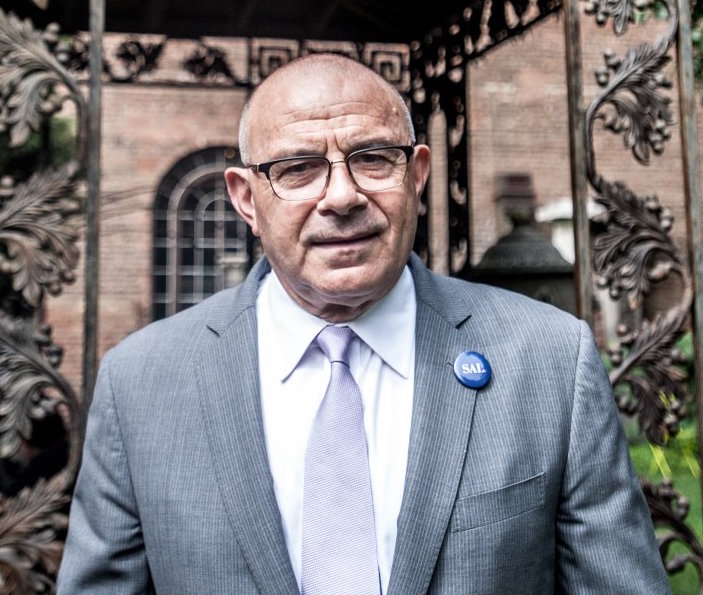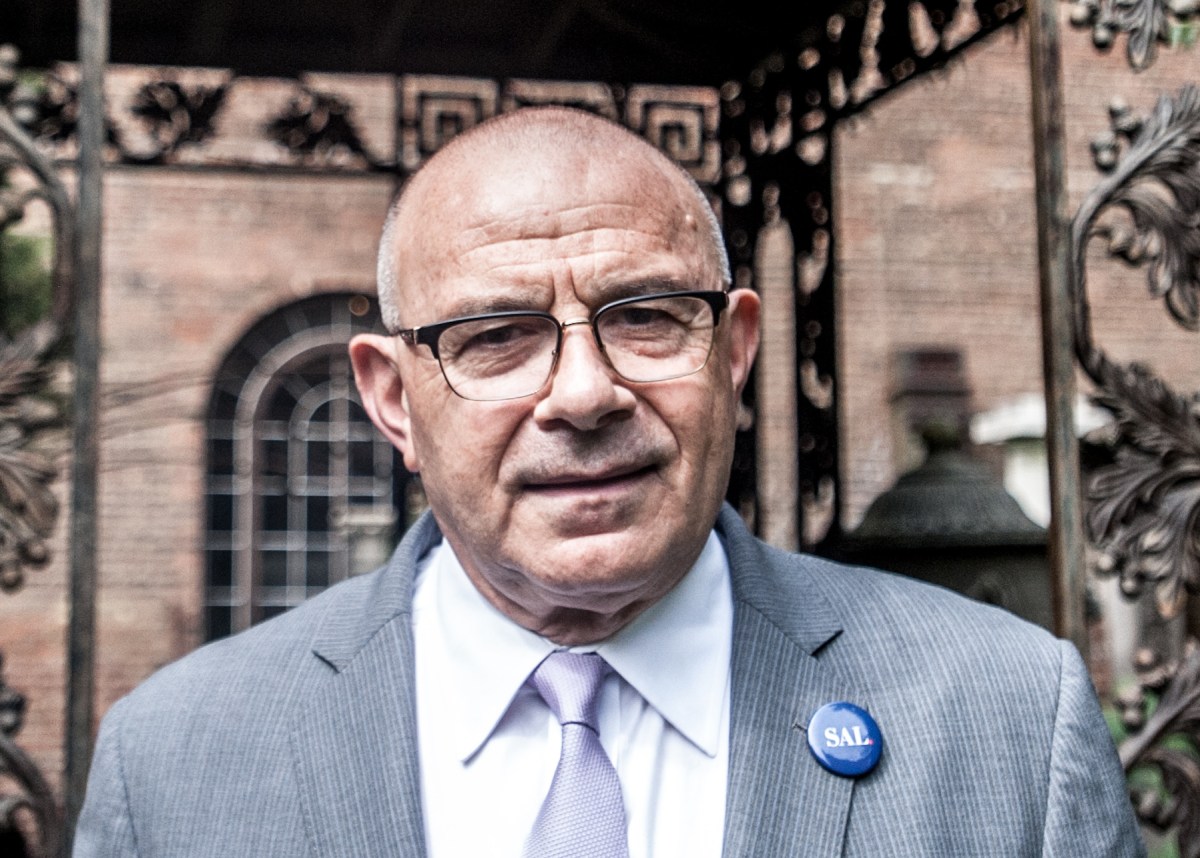
BY JULIANNE CUBA AND PAUL SCHINDLER | Sal Albanese, who earned a reputation as a maverick during his 16 years representing Bay Ridge on the City Council in the 1980s and ’90s, is making another run for mayor, after a strong third place finish in the 1997 Democratic primary, an abandoned campaign in 2001 and a weak finish four years ago.
This year, the 68-year-old Italian-born attorney, who now lives in Staten Island, is the most experienced of the handful of primary challengers to incumbent Mayor Bill de Blasio. Though defiant toward what he says is the mayor’s effort to marginalize his candidacy, Albanese is a clear underdog, having raised less than $210,000 with no public matching funds, according to city Campaign Finance Board records, and with just $22,000 in cash on hand. The mayor, in contrast, has spent $2.7 million and has nearly $5 million on hand.
In a spirited interview with editors from NYC Community Media and its sister company, Community News Group, on Aug. 31, Albanese delivered a harsh assessment of the incumbent, while laying out the ideas and qualifications he said make him the right choice in the Sept. 12 primary.
Zeroing in on federal and state investigations into the mayor’s fundraising practices — both in rewarding supporters and in funneling money into Upstate Democratic State Senate races in 2014 — Albanese charged, “We also have, in my opinion, one of the most corrupt periods in the city’s history since Ed Koch.”
Then, acknowledging that both the federal and state probes ended early this year with no prosecutions, he added, “He was not indicted because the pay-to-play laws are murky. I think we need a higher standard for a mayor than just not being indicted, and [that] he says people don’t care about that around the city. I beg to differ. I don’t accept money from lobbyists or big real estate, not because I’m anti-development or anti-real-estate developers. But what we’ve had from de Blasio is unfettered development, where we’re seeing the towerization of Manhattan.”
Albanese also piled on regarding the mayor’s record on homelessness, affordable housing and the failing subway system. New Yorkers, he said, are “fed up” and looking for a change.
Looking back to his time on the City Council representing Bay Ridge, Albanese touted his progressive credentials in a neighborhood then known as among the city’s most conservative enclaves. His support for the 1986 gay rights law, on which he said he was a “swing vote,” led to threats that had him guarded by a police officer for several days. He also pioneered living-wage legislation, with a 1995 proposal to require contractors doing business with the city to pay their workers $12 an hour, well above the minimum wage at the time. The measure that survived Council debate, however, disappointed workers’ advocates given the limited number of contractors who fell under its purview.
Encapsulating what he is offering voters, Albanese said, “I’m proud of the fact I had a reputation for independence and integrity. No one ever questioned that I was certainly an outsider. I’m running because I think that under this mayor, the city has become less livable.”
Turning to his financial disadvantage compared to the incumbent, Albanese portrayed that as a virtue.
“The one problem I do have, the funding is not up to de Blasio’s because I don’t accept money from big real estate and lobbyists, and I’m considered unreliable by those people given my history in the City Council,” he said.
However, his ability to spar publicly with the mayor one on one — in debates held Aug. 23 and Sept. 6 — gives the challenger hope he can break through.
“People are beginning to recognize me around the city and know that I’m running for mayor,” Albanese said. “Getting my name out there is now starting not to be a problem — because of the debate, there’s been a huge chunk of media interest. If I can convince people I can do this job — and of course my experience is wider and better than de Blasio’s. He’s been a professional politician — I’ve been a teacher, lawyer, got a finance background, people see that. I think we’re going to generate a better-than-average turnout because there are a lot of people that want de Blasio out of office all over the city — people who deeply dislike him or are blah about him.”
One area on which the challenger gave the incumbent high marks was on sustaining New York’s status as a sanctuary city, saying, “I don’t know what more we could be doing. I think in this particular case, de Blasio is doing a decent job at protecting the undocumented.”
In contrast, Albanese harshly criticized de Blasio’s relationship with police.
“I think what the police officers resent about the mayor is the way he’s politicized policing,” he said. “He’s demoralized the force.”
Regarding cases like the 2014 police killing of Eric Garner, a Staten Island man confronted for selling loose cigarettes who died after being put in a chokehold and wrestled to the ground, Albanese said that sort of situation should have been handled by a community police officer rather than by anti-crime cops. He also argued that better training is needed, particularly for dealing with mentally unstable people. After criticizing the mayor’s language toward police, Albanese said pre-screening of officers is also needed, noting that, unfortunately, there are some “ticking time bombs” among the force.
On homelessness and affordable housing, the challenger faulted de Blasio for being cozy with developers, something that stands in the way of a more aggressive housing policy.
“I want to build true affordable housing that the people in these neighborhoods can afford,” Albanese said. “The city owns 1,000 parcels of land. I want to use those parcels as the affordable housing. We can build about 67,000 affordable units, true affordable units.”
Paying for that kind of ambition, he said, would be possible through what he calls a pied-à-terre tax, put on luxury second-home apartments in the city purchased by international buyers looking for safe havens for their money and relatively indifferent to such a tax burden.
“We need to redesign this whole program,” he said, “and part of the reason we have this homeless crisis is because of his policies. De Blasio’s tax-the-rich scheme doesn’t work because he’s rolled that out three times and it impacts thousands of New Yorkers.”
The pied-à-terre tax, he argued, would be an easier political lift in Albany.
One other big issue Albanese has with the mayor is his failure to lead on mass transit issues. Though Governor Andrew Cuomo effectively controls the board of the Metropolitan Transportation Authority, Albanese said de Blasio could have more leverage if the city were willing to pay an equal share with the state of the M.T.A.’s capital budget — and also if he played nice with Cuomo.
“It would be part of my job to get along with Cuomo — you can’t make this stuff personal — it’s business,” Albanese said. “You really have to get along with the governor. That doesn’t mean you have to do everything that he says. I would be respectful, but very assertive. I think the relationship is toxic with de Blasio. I’m an outsider; de Blasio is a political mechanic. He should know better than this stuff. He just blew this relationship and it’s not going to get any better, it’s only going to get worse.”
Among Albanese’s key transportation goals would be enactment of a congestion-pricing scheme, along the lines proposed by the Move NY initiative, which would include tolls on the East River bridges, but toll relief on some other bridges. The additional revenues — up to $1 billion, he said — could be applied to bolstering the subway system.

































